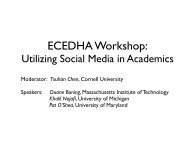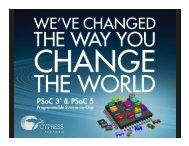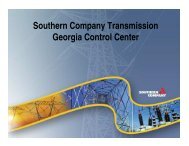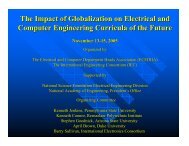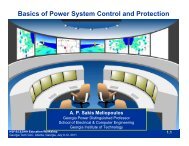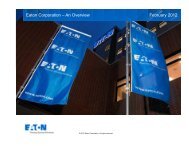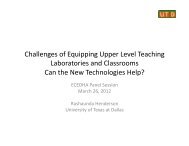Download the 2013 ECEDHA Annual Conference Program Guide
Download the 2013 ECEDHA Annual Conference Program Guide
Download the 2013 ECEDHA Annual Conference Program Guide
You also want an ePaper? Increase the reach of your titles
YUMPU automatically turns print PDFs into web optimized ePapers that Google loves.
<strong>2013</strong> <strong>ECEDHA</strong> <strong>Annual</strong> <strong>Conference</strong> and ECExpo Orlando, Florida . March 22–26, <strong>2013</strong><br />
2012 <strong>ECEDHA</strong> Awards Committee 2012 Innovative <strong>Program</strong> Award<br />
T<br />
he <strong>ECEDHA</strong> Awards Committee is responsible for administering<br />
<strong>the</strong> Robert M. Janowiak Outstanding Leadership and Service Award, <strong>the</strong><br />
Innovative <strong>Program</strong> Award, and <strong>the</strong> new Diversity Award. The committee’s<br />
tasks include soliciting nominees, reviewing applications, and selecting award<br />
winners.<br />
We would like to thank <strong>the</strong> <strong>ECEDHA</strong> Awards Committee for <strong>the</strong>ir efforts in <strong>the</strong> 2012<br />
<strong>ECEDHA</strong> Awards <strong>Program</strong>.<br />
T<br />
he Innovative <strong>Program</strong> Award is given to individual(s) or department(s)<br />
that has (have) created, implemented, and sustained <strong>the</strong> implementation<br />
of a successful innovative program and possibly assisted in <strong>the</strong><br />
implementation of that program at o<strong>the</strong>r institutions.<br />
A successful program is one that has stood <strong>the</strong> test of time (i.e., formal integration<br />
into a program of study) and has produced measurable improvements in <strong>the</strong> quality<br />
of <strong>the</strong> electrical and computer education received by a significant number of<br />
students at one or more institutions. Please join us in recognizing our 2012<br />
Innovative <strong>Program</strong> Award recipient.<br />
AWARDS COMMITTEE CHAIR:<br />
Steve Goodnick<br />
Agnieszka Miguel<br />
Reinvigorating Electric Energy Education Nationwide<br />
Professor of Electrical Engineering<br />
Arizona State University<br />
Ibrahim Abdel-Motaleb<br />
Professor and Chair<br />
Electrical Engineering Department<br />
Nor<strong>the</strong>rn Illinois University<br />
Kwang Lee<br />
Professor and Chair<br />
School of Engineering and<br />
Computer Science<br />
Baylor University<br />
Associate Professor and Chair<br />
Department of Electrical and<br />
Computer Engineering<br />
Seattle University<br />
Manoj Sachdev<br />
Professor and Department Chair<br />
Electrical and Computer<br />
Engineering<br />
University of Waterloo<br />
Mona Zaghloul<br />
Department Chair and Professor<br />
Electrical and Computer<br />
Engineering<br />
George Washington University<br />
Ned Mohan<br />
Professor<br />
Electrical and Computer<br />
Engineering<br />
University of Minnesota<br />
In 1990, Professor Mohan noticed that undergraduate<br />
courses in EES had changed very little since <strong>the</strong> 1950’s.<br />
His subsequent in-depth examination of how and what<br />
should be taught in EES courses resulted in new lecture<br />
materials, textbooks, laboratories, and pedagogical<br />
strategies for three EES core courses – Power Electronics,<br />
Power Systems, and Electric Machines and Drives.<br />
He developed <strong>the</strong> course content so that <strong>the</strong> instructor<br />
could use a flipped-classroom pedagogy, in which<br />
students watch lectures and demonstrations in a video<br />
clip prior to class, <strong>the</strong>n are actively engaged with <strong>the</strong><br />
instructor and <strong>the</strong>ir peers in discussion and problemsolving<br />
during class. In Professor Mohan’s experience –<br />
and as research has confirmed – students’ learning and<br />
retention of concepts is much greater in a flipped-<br />
classroom approach in comparison to face-to-face and<br />
purely online pedagogies.<br />
Recognizing that new courses had to be accompanied by<br />
rigorous faculty professional development, he developed<br />
lists of Course Learning Objectives; video clips for each<br />
lecture; concept quizzes that reinforced <strong>the</strong> fundamentals<br />
in videos, in-class discussion problems and activities;<br />
online homework problems; suggested laboratory<br />
experiments; a forum for discussion between instructors;<br />
and hardware- and software-based lab assignments.<br />
He has also organized 20 NSF-sponsored EES faculty<br />
workshops that have been attended by a large number of<br />
instructors and researchers since 1991.<br />
Professor Mohan’s efforts have had a nationwide impact.<br />
His EES curriculum has revitalized <strong>the</strong> power program at<br />
UMN – where student enrollments in <strong>the</strong>se courses have<br />
tripled over a decade – and significantly increased EES<br />
offerings and enrollments in o<strong>the</strong>r universities that have<br />
adopted it. He convinced 80 universities nationwide to<br />
form a consortium to utilize state-of-<strong>the</strong>-art laboratories<br />
in this curriculum. As a consequence of this program,<br />
<strong>the</strong> state-of-<strong>the</strong>-art laboratory experiments that he<br />
developed are being used in over 100 universities.<br />
March 22–26, <strong>2013</strong><br />
40<br />
Orlando, Florida<br />
<strong>2013</strong> <strong>Annual</strong> <strong>Conference</strong> and ECExpo www.ecedha.org<br />
41



